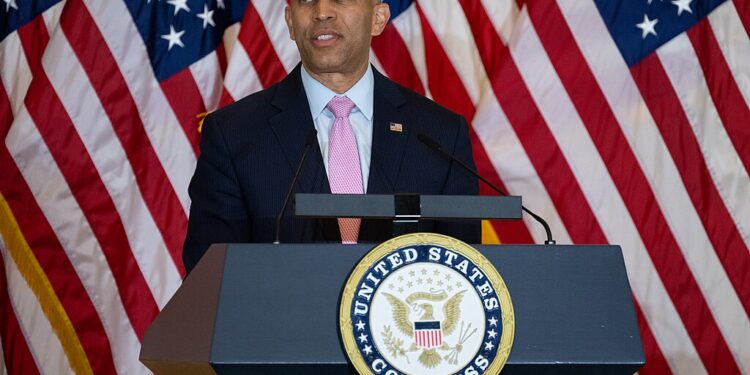
House Minority Leader Hakeem Jeffries (D-N.Y.) is once again taking aim at President Trump—this time blasting his administration’s decision to support Argentina’s new conservative government.
Jeffries accused Republicans of hypocrisy, claiming they’re willing to “bail out” a right-wing ally abroad while allegedly refusing to help American families at home. “It’s perplexing that Republicans won’t spend a dime to protect American health care but somehow found $40 billion to bail out a right-wing dictator in Argentina,” Jeffries said Wednesday.
The criticism came after Treasury Secretary Scott Bessent announced that the Trump administration is seeking an additional $20 billion in support for Argentine President Javier Milei—on top of the $20 billion already pledged to stabilize the nation’s collapsing economy. Bessent clarified that the funds would come from sovereign funds and private investors, not U.S. taxpayers, and noted that “many banks have expressed interest.”
President Milei, an unapologetic conservative populist and vocal supporter of President Trump, has been battling inflation and corruption left by Argentina’s socialist leadership. His economic reforms and pro-American stance have made him a target of left-wing critics across Latin America and in Washington.
Still, Democrats like Jeffries are accusing Trump of favoritism, claiming the assistance benefits foreign conservatives over struggling Americans. “This is corruption in real time,” Jeffries charged, while ignoring the fact that the funding aims to strengthen pro-U.S. alliances and counter China’s growing influence in the region.
Trump brushed off the attacks, telling reporters after a meeting with Milei that the U.S. “won’t be generous” if Argentina’s conservatives lose their upcoming elections. “If he wins, we’re staying with him. If he doesn’t, we’re gone,” Trump said—a statement that underscored his America First approach to foreign aid: supporting those who share America’s values, not those who undermine them.
While Democrats cry foul, Trump’s supporters see it differently: a bold move to reinforce economic freedom abroad, protect U.S. interests, and stand with allies who reject socialism.
